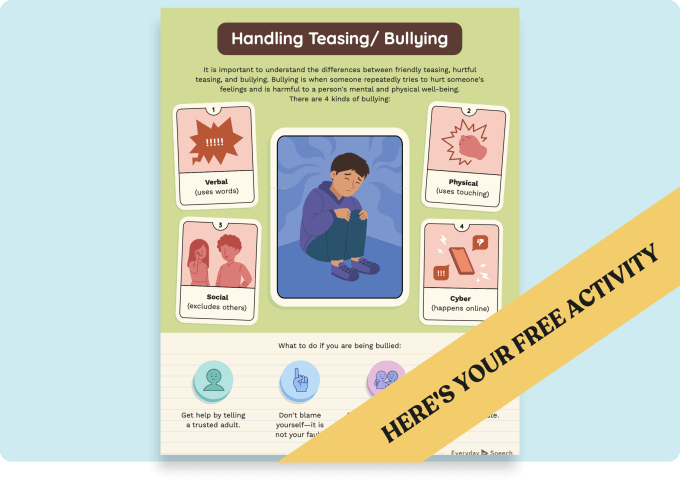Teaching PreK Students Not to Talk Over Others: A Guide for Educators
Get free social skills materials
No-prep lessons on self-regulation, emotional recognition, conversation skills, and more.
Sign up hereIntroduction
Talking over someone can lead to confusion and frustration in conversations. It is important for young learners to understand the concept of taking turns while speaking and to be attentive listeners. This blog post discusses an activity that helps teach PreK students the importance of not talking over others, as well as related skills and next steps for educators. By incorporating principles of Social-Emotional Learning, educators can help students develop strong communication skills and build healthy relationships with their peers.
No-Prep Activity: Stoplight Conversations
This simple, no-prep activity is designed to help PreK students understand the concept of waiting for their turn to speak and not talking over others. It requires no additional materials and can be implemented easily in the classroom setting.
- Divide students into pairs and have them sit facing each other.
- Explain to the students that they will be practicing their conversation skills and taking turns speaking. Remind them to pay attention to their partner and to look for their “green light” to speak.
- Choose a topic for the students to discuss, such as their favorite toy or a recent event at school.
- As the students engage in conversation, remind them to think of the stoplight: red light means their partner is speaking and they should listen, while green light means it’s their turn to speak.
- After a few minutes, gather the students together and ask them to share their experiences with the activity. Did they find it easy or difficult to wait for their turn to speak? How did it feel when they were able to listen and be heard?
Discussion Questions
Use these questions to stimulate further discussion and reflection on the importance of not talking over others:
- Why is it important to wait for our turn to speak in a conversation?
- How does it make you feel when someone talks over you? How do you think it makes others feel when you talk over them?
- What strategies can you use to help yourself remember to wait for your turn to speak?
- How can looking at the other person during a conversation help you know when it’s your turn to speak?
- Why is it important to be a good listener in addition to being a good speaker?
Related Skills
Beyond learning not to talk over others, there are several other related skills that can help PreK students develop strong communication abilities and positive social interactions:
- Active Listening: Teach students the importance of focusing on the speaker, maintaining eye contact, and providing nonverbal cues that show they are listening.
- Turn-Taking: Help students understand and practice the concept of taking turns in various situations, such as during playtime or group activities.
- Expressing Feelings: Encourage students to express their feelings and thoughts using appropriate words and phrases.
- Respecting Boundaries: Teach students the importance of respecting personal boundaries and understanding social cues in conversations.
Next Steps
Now that you have learned about the importance of teaching young learners not to talk over others, it’s time to take the next steps in incorporating these valuable communication skills into your classroom. To access free samples of related skill-building materials and resources, visit Everyday Speech’s sample materials and sign up today. With these tools, you can help your PreK students develop strong communication skills and foster positive social interactions.

